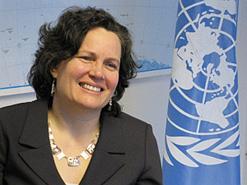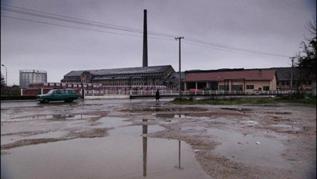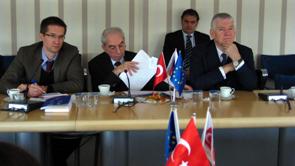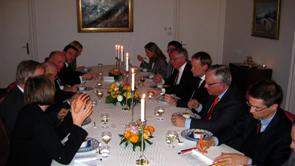
ESI newsletter4/2012
April 7, 2012
Dear friends,
The employment crisis in the Balkans has long been a central focus of our work (see links to selected ESI socio-economic research
below).
In 2007 we published our research on deindustrialisation and the disastrous jobs situation in the declining textile town of
Leskovac in South Serbia. We noted that this illustrated deeper problems facing all of Serbian society:
"high unemployment, a weak export-orientation and very low labor participation rates of two groups in particular: women and the young … The story of the collapse of the Serbian textile and clothing sector since 2000 thus goes to the heart of questions about both the economic and social future of the country."
In March 2012 we returned to Leskovac to interview the entrepreneurs we talked to six years before and assess what has happened since. ESI's
Eggert Hardtenfound that the employment situation in Leskovac remains nothing short of dramatic. There is a need for a renewed debate on growth policies in the Balkans, in response to a
wider concern among economists. It is a debate where ESI
plans to do more analysis in the coming year.
This crisis has also long been a concern for
Kori Udovicki, a former Governor of the National Bank of Serbia and former Minister of Energy. Kori Udovicki worked for the IMF, set up and ran an economic think tank in Belgrade and has, since 2007, been Assistant Secretary-General and Assistant Administrator of UNDP responsible for Europe and the Commonwealth of Independent States (CIS).
Recently Kori and Gerald put their heads together. Following brainstormings in Paris and Bruges they published an urgent appeal concerning the employment crisis in the Balkans, which you find here.
The Balkan Employment Crisis—an urgent appeal
(Oped by Kori Udovicki and Gerald Knaus)
 |  |
Kori Udovicki (UNDP) – Declining industries in Leskovac
|
Leskovac, once known as the Serbian Manchester, is home to a textile industry that began in the 19th century, flourished under communism, and survives – albeit barely – till today. The town, which lies in the south of Serbia, boasts a textile school (set up in 1947), an association of textile engineers, and its very own textile magazine. The boom years are a distant memory, however. Leskovac's socialist-era companies are bankrupt, their production halls empty, their machines dismantled and sold as scrap metal.
In the past two decades Leskovac has seen its population decline from 162,000 (1991) to less than 140,000. The drop in the working-age population has been disproportionately high, and unemployment has increased. At the heart of the town's plight, and that of so many other regions in the Western Balkans, is the impact of dramatic de-industrialization.
Contemporary Serbia is a society whose population is both aging (with an average age of 41, it is one of the oldest in the world) and shrinking. So is its industry. A recent article in the local press cites that 98 large, complex, industrial companies have shut down over the past two decades. And, most worrisomely, so is total employment. After stagnating throughout the economic recovery of the 2000s, it has been sharply declining since 2008. Today the employment rate is down to about 45 per cent, more than 20 per cent below the EU average. Half of the young are unemployed. In the textile and clothing sector, the number of workers has collapsed from 160,000 in 1990 to around 40,000 in 2010.
Serbia's textile industry is representative of much of its industry, and Serbia's labor market trends are representative of those in all the post-Yugoslav states. The employment rate in Albania is also one of the lowest in Europe.
It is true that Europe's textile industry has been put on the defensive by the emerging Far East. However, it would be wrong to conclude that Serbia's textile industry's decline has been inevitable. In recent decades, the sector – one of the most highly globalized in the world – has seen employment shift from Germany to Poland, from Hong Kong to China, from Italy to Hungary and Turkey, and then to Bulgaria and Romania. In many peripheral regions across South East Europe, textiles have been a recent locomotive of growth and exports, creating hundreds of thousands of low-skilled jobs. The question we need to ask is why so few of these jobs have found their way to the Western Balkans. Bulgaria was able to increase its exports in the textile and clothing sector from 280 million USD to more than 5 billion USD between 1990 and 2010, contributing more than 100,000 industrial jobs. Why hasn't this been possible in Serbia, Bosnia or Albania? The same questions could be asked about other industries in the Balkans. Why are there more than 10,000 jobs in the furniture industry in the Central Anatolian city of Kayseri, far from any woods, but not in Bosnia and Herzegovina? Why are household appliance producers doing well in Slovenia, Western Romania and Western Anatolia, but not in the Western Balkans? How about agro-processing for the EU market? And what about Bosnia's armaments industry, the mainstay of its industry in the past? Was its collapse really inevitable?
One answer is that the growth model adopted in the Western Balkans over the last decade has discouraged governments from asking such specific questions. Driven by distrust of the legacy of socialist planning, as well as by fear of state capture by corrupt businesses and corruption in the administration, the preferred economic policies have been hands-off, focusing not on specific sectors of the economy but on the general business environment. Policymakers have been praised for avoiding the temptation to shield declining areas of the economy from the discipline of the market. At the same time they found it hard to acknowledge when many former socialist businesses were past the point of possible recovery, overburdened by their debts and in urgent need of liquidation. Neither the political debates nor the legal framework in the region acknowledged that liquidation, sometimes, is the best way to ensure that existing resources—people and capital—remain in use, by being re-employed in the new growing private sector.
These key ingredients of the standard recipes of economic policy in the past decade are important, of course: a stable macroeconomic environment and a good business climate, in which it is easier to open and close businesses, are a necessary condition for sustained recovery. But they are not sufficient. In a region ravaged by conflict and the sheer length of economic decline, a policy mix of "hands-off", "rules-based" privatization and deregulation cannot be sufficient to launch sustained economic recovery. Even during the periods of relative economic growth and high FDI inflows, the employment generated by the new, entrepreneurial private sector was not sufficient to offset the jobs shed by the slowly restructuring and privatized old industries. The financial crisis of 2008 has wiped out more than the jobs generated in the recovery period, even if informal job generation is taken into account.
While the recovery lasted, there was a hope that FDI would yet accelerate and begin to generate more employment. Now, however, it is clear that the growth model needs to be changed. This has been noted by international institutions, most explicitly the European Bank for Reconstruction and Development (EBRD). More importantly, regional policymakers, under increasing pressure to generate jobs, have begun reaching for desperate measures, such as large, blanket, subsidies for foreign investors. This is the kind of step that has so often in the past given industrial policy a bad name.
What would an alternative model of economic growth look like? In answering this question, it helps to keep in mind that there is not, in fact, one simple answer. Each time, the answer depends on the context. Clearly, the key is the inclusion into global chains of industrial production. Credible industrial policies are needed to define ways of encouraging the mobile global investments to those sectors – from food processing to clothing, from furniture to basic engineering assembly – where declining industrial regions in the Balkans possess a comparative advantage. For this one needs a better understanding of the drivers behind the industrial jobs that are already being generated. In Leskovac, for example, over the past five years new jobs have been linked to investments by companies from Germany, South Korea and Turkey.
The question then becomes: what could be done to turn the trickle into a flood? Comparative advantages are likely to be still hiding in the remnants of the past. Declining industries have left behind redundant workers and educational institutions without the skills and resources needed to adjust to a new marketplace. Provincial cities like Leskovac lack foreign contacts. However, the right initiatives and support can deliver the necessary resources at a fraction of the costs that it would take to create a conducive environment "from scratch".
A competent industrial development agency, modelled, for example, on the Irish Industrial Development Agency (IRA) could do this job. The key word here is "competent". It would have to be able to offer support and advice – based on credible and painstaking sectoral analysis – to local administrations and companies. It would need to help educate local governments about ways of attracting investors. It could also offer grants for private sector management training, to enable their companies to move up the value chain in different sectors of production.
This is not an easy task. However, there is no reason to assume that such competence in the Western Balkans could not be put together and built up. For this, however, it is necessary, that a new philosophy for the role of industrial policy in economic growth be embraced. This can only be done by the policymakers and governments of the countries themselves.
The EU could also help, however. All too often in the past two decades, the message coming across from EU officials and international financial institutions has, instead, been one of blanket discouragement of government intervention. The EU could do more to support the countries' ability to develop and pursue credible multiyear strategies in a whole range of sectors, including agriculture and rural development, transportation, environment, and regional development. During the last enlargement wave, each candidate country integrated such strategies into a National Development Plan (NDP), which functioned both as a national roadmap and as a programming document for EU assistance. Such an approach would benefit the countries of the Western Balkans, where the public sector suffers from a dearth of planning capacity and resources for policy development.
Last but not least, the credibility of Western Balkan integration into the EU market could be enhanced. For the Western Balkans, the last few years have seen agonizingly slow progress in this area, with no country other than Croatia having so much as opened EU accession talks. The more realistic the perspective of EU membership for countries such as Serbia or Albania, the bigger the incentives for those interested in long-term investments in industrial production in the Balkans.
Integration with the EU market will be a critical anchor for economic development in the Balkans, but it will take more to ensure convergence. The example of Greece shows that integration and access to funds is not enough. Greece is currently not able to absorb more than a third of EU structural and cohesion policy funding, because it has never benefited from the massive capacity-building and institutional support that has been given to the Fifth enlargement countries and Croatia. Looking on to the Western Balkan batch, the EU may consider increasing this support, emphasizing the administrative capacity for medium-term development in policy planning and coordination. Bringing development planning into an earlier stage of the current accession process would allow each Balkan country to focus on the assessment of its competitiveness in agriculture and industry, and learn about the constraints to development faced by these sectors.
None of this is to suggest that there is a silver bullet for job creation. The Balkan development challenge is enormous, and there are deep structural reasons behind the staggeringly low rates of employment in the region – some reaching back into the 1980s and the very nature of socialist industrialisation. Reversing the long-term trend of employment decline is a generational project, made all the more difficult by the current cyclical conditions in Europe. But reindustrialisation has taken place in recent years in a number of new member states or candidates, from Poland to Slovakia. Numerous industrial development clusters – from Timisoara in Western Romania to the Istanbul region and many Anatolian tiger cities in Turkey – have seen growth and success. In all these cases, political elites at the national and local level have made the integration of local businesses into global chains of industrial production a strategic priority.
The lack of employment opportunities today in the Western Balkans is generating quiet despair, especially among the young. Without radical change, without a serious and visible commitment to a new set of policies, the sense of despair now palpable in the region may become burning. There is, in fact, no greater, more urgent, social and economic issue in the Balkans. Fortunately, experiences of successful industrial recoveries and turnarounds abound. Learning from them could turn around the fate of people in Leskovac, and countless other towns just like it.
Discussing strategies to get to visa free travel in Ankara
 |
ESI – how to make the case for visa free travel – with President Abdullah Gul and his team
|
On 22 March, ESI senior project
advisory board members Giuliano Amato, former prime and interior minister of Italy, and Otto Schily, former minister of interior of Germany, as well as ESI's Gerald Knaus, Alexandra Stiglmayer and Nigar Goksel and representatives of the
Mercator Foundation, which supports the ESI Turkey visa project, met with President
Abdullah Gul to discuss
ESI's proposal to achieve visa free travel for Turkey.
The ESI delegation met with senior Turkish officials, EU ambassadors and other senior EU officials. We discussed
how to best achieve visa free travel at an eventorganized by a leading Turkish think tank, TEPAV, on the same day. USAK in Ankara also hosted ESI's Gerald Knaus and Alexandra Stiglmayer on 23 March to discuss
Breaking through the Schengen Wall: a visa liberalisation strategy for Turkey in 2012.
 |  |
Giuliano Amato, and Otto Schily at the TEPAV event – Dinner with EU ambassadors at the Swedish Embassy
|
Azerbaijani democracy on the eve of Eurovision
 |
Panel debate on Azerbaijan in London: Giorgi Gogia – Gerald Knaus – Rebecca Vincent – Khadija Ismayilova – Vugar Gojayev
|
ESI's Gerald Knaus was invited to a panel discussion on Azerbaijan at the Frontline Club in London. You can see his presentation here:
how Azerbaijan captured Europe's oldest human rights organisation, the Council of Europe, evaded its commitments, turned election monitoring into a political farce and silenced its critics.
Other speakers on the panel were some of the most distinguished journalists and human rights activists in the country:
Khadija Ismayilova, bureau chief for RFE/RL's Azerbaijani Service, Baku, Azerbaijan,
Vugar Gojayev, researcher and journalist, Baku, Azerbaijan, and
Giorgi Gogia, Caucasus researcher at Human Rights Watch, Tbilisi, Georgia. Moderator:
Rebecca Vincent, Azerbaijan Advocacy Assistant, Article 19.
Last year, ESI released a report on the
Generation Facebook in Baku and published a series of analyses on the topic of
whether Azerbaijan is still a democracy. We have now updated this section, including
Oil boom and resource curse,
Repression in Azerbaijan, and
Recommended reading. There are more ESI reports coming up on Azerbaijan in the coming weeks.
Many best wishes,

Gerald Knaus


 Kori Udovicki (UNDP) – Declining industries in Leskovac
Kori Udovicki (UNDP) – Declining industries in Leskovac ESI – how to make the case for visa free travel – with President Abdullah Gul and his team
ESI – how to make the case for visa free travel – with President Abdullah Gul and his team
 Giuliano Amato, and Otto Schily at the TEPAV event – Dinner with EU ambassadors at the Swedish Embassy
Giuliano Amato, and Otto Schily at the TEPAV event – Dinner with EU ambassadors at the Swedish Embassy Panel debate on Azerbaijan in London: Giorgi Gogia – Gerald Knaus – Rebecca Vincent – Khadija Ismayilova – Vugar Gojayev
Panel debate on Azerbaijan in London: Giorgi Gogia – Gerald Knaus – Rebecca Vincent – Khadija Ismayilova – Vugar Gojayev
 Gerald Knaus (video) – Emin Milli
Gerald Knaus (video) – Emin Milli






Nema komentara:
Objavi komentar